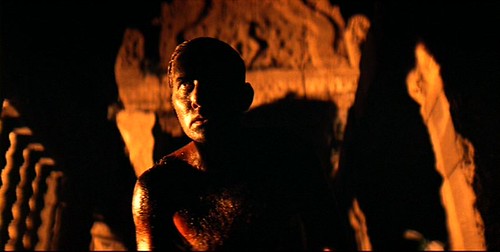Yamashita did
order the commander of Shimbu Group, Gen. Shizuo Yokoyama, to destroy all bridges and other vital installations and then evacuate the city as soon as any large American forces made their appearance.
However,
Rear Admiral Sanji Iwabuchi, commander of the Imperial Japanese Navy's 31st Naval Special Base Force, was determined to fight a last-ditch battle in Manila, and, though nominally part of the Shimbu Army Group, repeatedly ignored Army orders to withdraw from the city. The naval staff in Japan agreed to Iwabuchi's scheme, eroding a frustrated Yamashita's attempts at confronting the Americans with a concerted, unified defense ***
- Sandler, Stanley – World War II in the Pacific: An Encyclopedia, p.469
- Connaughton, R., Pimlott, J., and Anderson, D., 1995, The Battle for Manila, London: Bloomsbury Publishing, ISBN 0891415785 pp. 72-73
Iwabuchi had 12,500 men under his command, designated the Manila Naval Defence Force, augmented by 4,500 army personnel under Col. Katsuzo Noguchi and Capt. Saburo Abe. - Connaughton, Pimlott, and Anderson, p. 73
*** The Shimbu Group under Gen. Shizuo Yokoyama fortified their positions east of Manila in the Sierra Madre mountain range - practically controlling Ipo Dam, Wawa Dam, and its surrounding areas.
The result was a seesaw battle, and the longest continuous combat engagement in the Southwest Pacific Theater from February 28 to May 30, 1945. Facing the Shimbu Group during the Battle of Wawa Dam and Battle of Ipo Dam was initially the 6th Army's XIV Corps, and this would later be replaced by the XI Corps. While the fighting took 3 months, the American forces supported by Philippine guerrillas forced decimated the Shimbu Group, forcing Gen. Yokoyama to retreat his forces further east. - MacArthur, Douglas. "Reports of General MacArthur Vol. 1".
US Army Center for Military History. Retrieved April 28, 2023.
In all, ten U.S. divisions and five independent regiments battled on Luzon, making it the largest American campaign of the Pacific war, involving more troops than the United States had used in North Africa, Italy, or southern France.
Japanese Fourteenth Area Army aka Shimbu Group (
map)
Components:
8th Infantry Division
39th Independent Mixed Brigade
IJA 65th Independent Infantry Brigade
IJA 9th Artillery Headquarters



